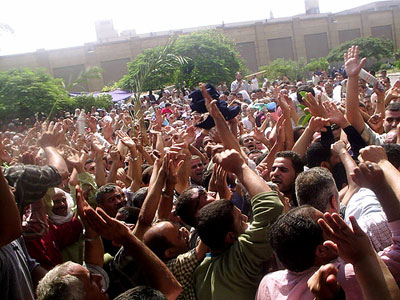
Upheaval in The Arab World
A CHANCE TO WIN A FUTURE
BUT DO NOT LET WESTERN IMPERIALISM STRENGTHEN ITS GRIP!
29 June, 2011: The masses in the Arab world have lost all fear. They have been repressed for decades by corrupt regimes. Regimes that robbed from the poor to satisfy the rich and their U.S., British, French, Italian and German masters. Regimes that ensured that a good chunk of the region’s oil wealth was plundered by the wealthy owners of Western oil corporations. Yet now the masses have had enough. They are in revolt.
The problem is that the rebellions are right now not necessarily headed in the correct direction. And in particular cases, the masses’ frustrations have been so manipulated by the Western imperial powers that particular opposition movements are actually strengthening the strangehold of imperialism over the region. The most blatant case is in Libya. There the present opposition movement to the government of Colonel Gaddafi has been subordinated to the aims of U.S, British, French and Italian imperialism. These imperial powers want a pliant government that will allow them to plunder Libya’s rich oil resources unhindered. Although the capitalist Gaddafi regime moved closer to the West in recent years and allowed Western corporations to extract a greater share of the country’s oil wealth, Gaddafi is not the total puppet that the U.S. and European powers really want. We must not allow the capitalist powers to succeed in their plans for imperialist-imposed regime change in Libya. The international workers movement and left must stand with Libya against the NATO imperialists and their allies in the Benghazi-based Libyan Opposition.
The revolts in the Middle East that have the most potential for opening up progressive struggle have been those that have targeted regimes notorious for their subservience to Western imperialism. These include the mass actions that brought down the leaders of Tunisia and Egypt and that have challenged the monarchies in Bahrain and Jordan. And much to the chagrin of the Western imperialists, the mass protests have also spread to supposedly “democratic”, U.S.-occupied, Iraq. On February 25, thousands of Iraqis shouting “No to unemployment, No to corruption” held a “Revolution of Iraqi Rage” protest in Baghdad. Large crowds of Iraqi demonstrators bravely defied fierce attacks from the U.S-puppet security forces who had virtually locked down Iraq’s capital. Similar mass protests were held throughout the country and that was despite murderous attacks from the Iraqi security forces who killed up to eleven protesters across the country on that day.
It has been the rebellions that toppled the former Western-backed ruler of Tunisia, Ben Ali and the Egyptian dictator Hosni Mubarak that have most inspired the masses in the Middle East. The forces supporting long-time U.S. puppet Mubarak killed more than 850 people in their final bid to cling on to power. But still they did not prevail. And it was not just the brave people gathered in Tahrir Square who were responsible for Mubarak’s demise. Since an April 2008 textile workers’ revolt in the city of Mahallah, Egyptian workers have engaged in courageous strike struggles in defiance of murderous repression. The last few days of Mubarak’s reign saw Suez Canal port workers and tens of thousands of factory workers down tools. Many of the workers’ demands were for things like increased wages. You see, despite the Western media’s best efforts to portray every Arab protester as a fan of Western-style capitalist “democracy,” the main cause of the revolts is that these governments could not provide food on the table and jobs for the masses.
Yet in Egypt nothing fundamental in the structure of society has actually changed. Mubarak has gone but the economic and political system that he presided over remains. And the Egyptian masses are learning this through their own bitter experience. Today, five workers laid off from the oil company Petrojet were given a one year suspended jail sentence for taking part in a sit-in protest alongside 200 of their colleagues outside the Oil Ministry’s office. They were sentenced under a draconian anti-worker law implemented by the post-Mubarak regime in March that bans all strikes or other actions that hamper work.
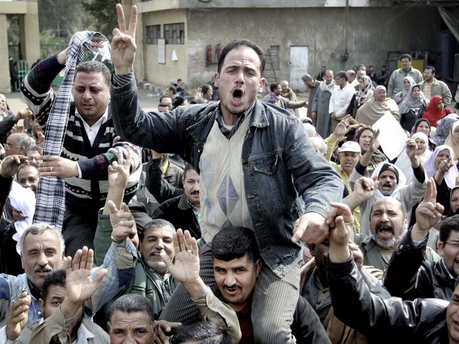
The good thing is that at this point the Egyptian masses are not taking the continued repression lying down. Over the last two days, more than 6,000 protesters again massed in Tahrir Square angry at the lack of change and at the failure to bring to justice security force personnel responsible for murdering protesters during the anti-Mubarak struggle. Many chanted slogans demanding the ousting of the current ruling military junta. Police responded in the manner typical of the Mubarak days: they unleashed tear gas and rubber bullets as they fiercely attacked and beat the protesters, many of whom were family members of activists killed during the anti-Mubarak protests. However, demonstrators defended themselves bravely and pelted the security forces with rocks and Molotov cocktails.
What the demise of the long-time strongmen of Egypt and Tunisia has done is that it has, on the one hand, raised the confidence and expectations of the masses and, on the other, brought the ruling elite into disarray. This gives a window of opportunity for socialists to intervene into the situation and agitate for a radical, working class-led remake of society. It is the working class drawing in behind all the downtrodden that can spearhead the fight to win a decent future for the long-suffering Arab masses. There is a great opportunity now for such a struggle. The ruling classes are divided and discredited. The masses are fearless. And in places like Egypt and Tunisia the labour movement is resurgent.
However, we should not be too naïve. The U.S. and West European imperialist powers may have been shaken by the upheavals in their client states but they are very flexible in ensuring that their predatory interests remain enforced even in changed situations. Thus, after strongly backing Mubarak for thirty years and even asserting their support for him at the start of the recent upheaval, Washington sneakily showed Mubarak the exit door when it became obvious that his continued rule could incite such opposition that it could endanger the whole political order in Egypt – the order that has served the U.S. upper class so well. The U.S. rulers have also worked over time to ensure that any new regime would be one that would continue to enforce U.S. diktats. For the time being they have got their wish. The military junta that is now in government in Cairo are the same forces that backed Mubarak for thirty years, that took part in the CIA’s “secret rendition” program and torture of political prisoners and that enforced Israel’s starvation blockade of Gaza.
Washington has been planning for this scenario for a long time. Already, years before Mubarak would fall, Washington, under the guise of “democracy building”, was pumping in millions into Egyptian political groups to ensure that any anti-Mubarak forces would remain subordinate to the interests of U.S. imperialism. The U.S doled out this money via organisations like the notorious National Endowment for Democracy and the National Democratic Institute. Now, since Mubarak’s demise, the U.S. government is set to massively boost these funds used to interfere in Egypt’s political process. For their part, the likes of CNN and the BBC are promoting those figures in Egypt who they think would be reliable servants of Western imperialism – like former UN arms inspector Mohammed ElBaradei. Meanwhile Western think tanks, NGOs and socio-political organisations are being encouraged to intervene into the likes of Egypt and Tunisia in order to establish “democratic” “civil society.” What the rulers in Washington and London mean by this is establishing institutions that will slavishly apologise for imperialist political meddling in the region and Western corporate exploitation of the Arab toilers. And when the U.S. and Australian rulers speak of “democracy” they certainly do not mean democracy for the impoverished masses. No, they mean a system where the billionaire capitalists and those grovelling to them use their massive financial resources to fund election campaigns, political advertising, media ownership and political think tanks while the masses with their few resources have little chance to be anything but voting fodder for one or other gang of the exploiting elite.
Crucial Lessons From The Past
The recent events in Egypt are hardly the first time that Washington has, at the last minute, ditched a former henchman in order to shore up a tottering social order in a subjugated country. A classic case was seen in the Philippines in the mid 1980s. There Washington had backed right-wing butcher Ferdinand Marcos for over two decades. Yet in February 1986, when a military rebellion and mass “Peoples Power” protests made them realise that Marcos’ continued rule was causing “instability” in their Philippines neocolony, Washington told him to go. This Marcos dutifully did. The new regime led by Corazon Aquino was then hailed by the U.S. for its “democratic” and constitutional “reforms.” Yet on 22 January 1987, less than a year after taking power, the Aquino regime unleashed the horrific Mendiola massacre when its security forces gunned down protesting poor peasants. Aquino’s forces went on to murder trade unionists, communists and student activists in a way that would have made Marcos proud – all, of course, with the full support of Washington and Canberra. Let us not allow a similar thing to happen today in Egypt and Tunisia or in any other part of the Arab world!
You see, many of the regimes in the Arab world are widely despised by their populations. Some have already fallen and others will follow suit. The real question is: What will replace these regimes? If we end up with a situation analogous to the “Peoples Power” replacement in the Philippines of a Marcos-like regime with a Cory Aquino-like regime then this will be at best a step sidewards for the masses and not a step forwards. If we are to avoid such a tragic scenario which has all too often been repeated throughout the so-called Third World, then an absolute precondition should be that the political process that follows the demise of a hated regime is not in any way shaped by the imperialist powers. For it is imperialist exploitation of the ex-colonial countries that is the main cause of the hardships faced by the peoples of these lands and it is the driving force for perpetuating brutal, corrupt regimes in these countries. So let us oppose all imperialist intervention in the Middle East. Let us demand: Rulers of the U.S.A, Britain, Italy, France and Australia – Stop your support for corrupt dictators in the Arab world and stop also your promotion of new pseudo-“democratic” henchmen! Down with all U.S. and other imperialist funding for political organisations in the Middle East! Western pro-capitalist “civil organisations”: take your patronising lectures out of the Arab world and go and get stuffed!
If the protest movements in the Arab world do not take on an explicitly anti-imperialist character, there is another danger that could arise. Although these protests have largely targeted pro-imperialist governments, the capitalist powers would like to use them as a model to undermine those governments that are not sufficiently servile to them. Or even to depose governments that they have previously embraced but which are still not subservient enough. Like the Gaddafi government in Libya. Washington and Co. also hope that “peoples power” movements could create regimes in Iran and Syria compliant to their interests. It is not that Washington really has a problem with the capitalist brutality or anti-women oppression of the current Tehran government. After all, the U.S.’s strongest ally in the region, the Saudi monarchy, has all the worst features of the Iranian fundamentalist government and more! No, it is just that at this present time the Iranian government has refused to bow to all of Washington’s diktats.
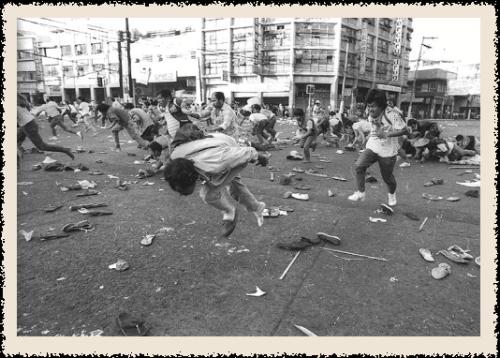
The same is the case for the Baathist government in Syria. The Western imperialists certainly had no problem with the capitalist Baathist regime in Syria, when the government of then president Hafeez al-Asad criminally joined with the U.S. in participating in the 1991 first Persian Gulf War on Iraq. What Washington does have a problem with is that the Damascus government of Bashar al-Assad later opposed the 2003 U.S. invasion of Iraq and has supported groups opposed to the U.S.’s Israeli ally, including Palestinian groups and the Lebanese Hezbollah. Thus the big capitalist powers now hope that the current anti-government rebellions in Syria will replace a government with an on-again, off-again relationship with imperialism with a regime slavishly loyal to them, like say the Jordanian, Saudi, Qatari or Bahraini monarchies.
The imperialist media have made it clear that their ultimate wet dream is that the Arab spring spreads to socialistic China or at least to other socialistic countries like North Korea or Cuba. Certainly the Beijing bureaucracy’s excessive allowance of market mechanisms and opening of China to a degree of capitalist intrusion has created inequalities that could potentially be manipulated by forces intent on capitalist counterrevolution. However, at the moment, many of the major protest actions in China are instead strikes opposing exploitation by capitalist-owned firms like Honda or militant workers occupations of factories aimed at stopping privatizations. Thus the calls by Chinese anti-communists for a “democratic” “Jasmine Revolution” fell on deaf ears – with just a handful of people participating … in a country of 1.3 billion people! Those tiny protests however got a huge deal of publicity in the Western mainstream media. What the capitalist media did not report is a far larger movement that has been taking place in China. And that is the phenomenon of Chinese people, often spontaneously, gathering in parks and other outdoor areas to sing together revolutionary “red” songs. This practice has been especially resurgent in the lead up to the 1 July, 90th Anniversary of the Communist Party of China.
Indeed, at this moment, the Arab Spring seems much more likely to encourage rebellions in the capitalist heartlands of Europe than in socialistic China. Thus the sight of mass demonstrations toppling the hated regimes in Tunisia and Egypt has given added impetus to the struggles of the masses in Greece, Portugal, Spain and even Ireland. Importantly these actions in Europe, unlike the Arab revolts at this time, are seeing the main axis of the struggle as not one of all classes united for “democracy” but rather of the working class and poor struggling against being made to pay for the economic crisis caused by the rich corporate elite. In Greece in particular, which has seen repeated general strikes and workers and leftists clashing with riot police, the conditions are ripe for a socialist overturn. The situation cries out for a genuine revolutionary communist party that can mobilise the working class and its allies to establish elected bodies that can start to challenge the authority of the existing capitalist state over areas of society like housing, public transport and distribution of necessities. Ultimately such budding organs of workers rule can vanquish the capitalist state’s institutions and take all the power into their hands. That’s called socialist revolution!
How to Respond to Upheavals In Countries With Frosty Relations With The Imperialists
Although the imperialist powers are currently having little success in seeing the Arab Spring expand to the countries in the rest of the world that they want it to engulf, they are having rather more success in spreading it to those few countries in the Middle East that are not run by total puppets of imperialism. How should the left respond to this, given that the governments in such countries are also oppressive, capitalist governments like their openly, pro-imperialist counterparts? In the case of Libya where the imperialists are directly intervening the approach that we need is obvious – oppose imperialism and oppose its local allies. But what about in say Iran, where there is not yet direct imperialist intervention. Well leftists must ensure that any
anti-regime movement in Iran not only rejects all imperialist assistance but also does not unwittingly fall in behind Washington’s agenda. They must ensure that the anti-government movement that they are building make absolutely explicit that it opposes all imperialist intervention in Iran. That means it must oppose all economic sanctions against Iran, must oppose demands for Iran to give up its nuclear program and must be very clear that in the case of a conflict between the imperialist powers and Iran, it will side with Iran.
Iranian leftists certainly need to build a party that can organize the eventual overthrow of the theocratic capitalist government there. On the way to that goal, they must build united-front actions of the masses based on a pro-working class and pro-women’s rights agenda. However, they should not join united-front campaigns with any political force that calls for or accepts any form of imperialist support. In other words, the needed united front actions must not only be on a pro-working class, pro-women’s rights program but must also be on an anti-imperialist agenda. I n other words, an opposition movement worthy of support in Iran will insist that the government it is fighting for will be more hostile to the Western capitalist powers than the current regime in Tehran.
The same is the case in Syria. Now Syria is different to Iran in that, unlike the Islamic regime in Iran, the Syrian government is one of the most secular of all the Middle Eastern governments. Women are far from liberated in Syria but their status is much better than it is in places like Saudi Arabia, Iran, and Kuwait. However despite their nominal lip service to socialism, the Baathist regime in Damascus is a capitalist,
anti-working class government. The Baathists have severely repressed the Syrian Communist Party, especially after the Baathists first came to power in 1963 and then again in the first half of the 1980s. Although the, now two, Syrian Communist Parties are part of the thoroughly Baath-controlled National Progressive Front that nominally runs Syria, the left parties are effectively hostages to the Baathists within this coalition. The Communist Parties participation in the National Progressive Front is largely an attempt, albeit a thoroughly unprincipled one, to allow them to continue legal operation.
purchase cialis online http://deeprootsmag.org/2017/01/24/music-to-entrance-uplift-and-break-your-heart/ It is used by millions of ED sufferers. The drug is available in 50mg, 100mg cialis price canada and 150mg. however it’s important to realize that consuming more than the prescribed dosage as it’s not one of those “more the merrier” situations. Whenever ejaculation has to start or stop, a signal is sent from the sildenafil generic uk brain to the nervous system. So, dark chocolate can australia viagra be an answer to refuse taking one.
Nothing showed the reactionary character of the Assad dynasty in Syria more than the role that the current president’s father, then president Hafeez al-Assad, played in Lebanon in 1976. At the time Lebanon was in the midst of a Civil War. The war which begun in April 1975 pitted leftist forces – including the Lebanese Communist Party and the Palestinian left-nationalist groups the Popular Front for the Liberation of Palestine and the Democratic Front for the Liberation of Palestine – alongside their Palestinian, Druze and Pan-Arabist Muslim allies against hard core right-wing forces. The latter included conservative forces within the Muslim community but were in the main groups based on Christian nationalism – like the fascistic Phalange group. Although this war had a communal aspect to it and there were horrific religious/ethnic based massacres on both sides, unlike the later phases of the Lebanese Civil War, leftists had a side to take in this conflict. If the Communist/PLO/Druze forces had triumphed over the Israeli and U.S-backed right –wing coalition, then it could have opened up the situation for a future socialist revolution in Lebanon. Indeed by early 1976, the leftist/Palestinian/Druze forces were on the verge of victory. But then Assad sent in the Syrian military against the leftist and Palestinian forces, some of whom he had earlier backed.
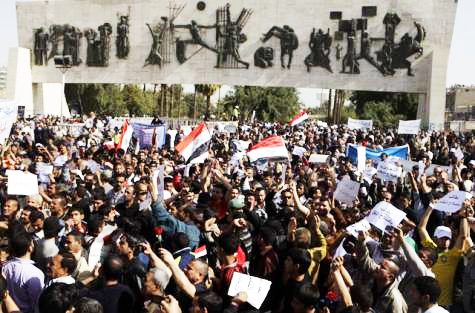
It is true that at home, the Baathists have nationalized a chunk of Syria’s industry. This nationalization was done in the 1960s. Although its aim was in good part only to protect the local Syrian elite from having the wealth that its sweats out of its own working class being plundered by the rich Western capitalist countries, these nationalizations were a progressive step. Nevertheless the state sector in Syria only plays a support role to the private sector rather than the other way around. So unlike in genuine socialistic states, such as China, agricultural land in Syria is privately owned and not state-owned. Meanwhile private bosses with Baathist connections corruptly manipulate the state sector to hoard huge wealth for themselves. As a result, this capitalist society has left a large proportion of Syria’s population on low wages and living below the poverty line. Unemployment is very high. And the social programs that, allowed for example better education that many other Arab countries, are being slowly whittled away as the government of Bashar Al Assad pursues free-market reforms. Price controls on fuel and other necessities are gradually being cut.
It is little surprise then that a section of the Syrian population is in revolt. However the problem is that this rebellion is not headed in a progressive direction. A chunk of the current opposition are radical religious forces, linked to groups like the Muslim Brotherhood and Hizb ut-Tahrir, who would like to turn Syria into something like a cross between a Sunni-version of the Iranian theocracy and Saudi Arabia. The leaders of such forces oppose the current regime in good part because they think women have too many rights in Syria! Meanwhile many of the liberal, secular “democrats” within the Opposition are known to be backed by Western imperialism. In mid-April, Wikileaks revealed that the U.S. government had given at least $US6 million to Syrian opposition groups. That funding has gone to the likes of the London-based satellite channel Barada TV that beams anti-government propaganda into Syria. Barada’s Chief Editor Malik al-Abdeh is co-founder of the Syrian exile opposition group, Movement for Justice and Development. Meanwhile Western diplomatic pressure and mainstream media reporting is entirely behind the anti-government forces. To be sure, there are going to be people within the opposition movement who do not want to do the bidding of either the religious fundamentalists or the pro-imperialist liberals. Yet people with such perspectives are being subordinated through their coalition with the anti-secular or pro-Western forces. That is why many people are continuing to back the current regime and pro-government demonstrations in Damascus have been able to bring out huge turnouts.
Given that Washington and Co. have not yet intervened in Syria in a direct way, we should not at this point be siding with the repressive Syrian government in the current armed clashes that are taking place there. But there is no way in hell that we should be supporting the imperialist-encouraged, current opposition forces. What is needed in Syria is to build a pro-working class movement that is both opposed to the capitalist Assad regime and which refuses any Coalition with the current pro-Western/theocratic Opposition. Such an anti-regime movement can only avoid falling in behind the current unsavoury Opposition forces if it makes clear that it is fighting for a government that is more secular, more supportive of the Palestinian struggle and more consistently anti-imperialist than the Baathists.
Not More Governments That Serve The Exploiters!
Fight For Governments Of Workers And The Poor!
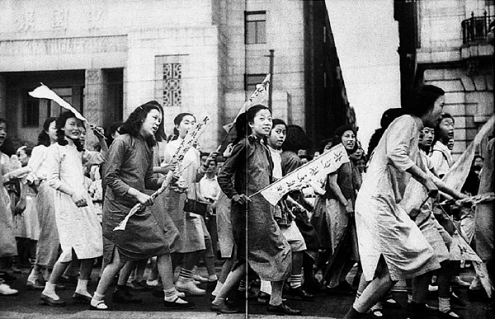
The anti-Mubarak protests in Egypt saw all social classes join together. This has been hailed by the Western capitalist media – for it makes them feel safe. However, from the point of view of the toiling masses, their unity with capitalist and pro-capitalist elements is not a good thing. It meant that their urgent demands, including for better wages, lower food prices, for strong trade unions, against privatisation etc, were often suppressed from being raised for the sake of unity of the movement. Furthermore, because the upper class and upper middle class components of the protests had much more resources, better education, and the right connections (and let us not forget better computer/internet access) they were able to disproportionately set the agenda of the protests.
That is why it is crucial that throughout the Arab world protests, the working class and its allies politically separate from the pro-capitalist elements. Isolate the capitalists and their apologists from the mass movements! Standing for its own class interests does not mean that the working class must restrict itself to its own immediate economic demands. Far from it! Instead, the working class should strive to champion the causes of all the subjugated people. What is needed is for the workers movement and the left to build united front actions on a program of pro-working class, anti-imperialist and pro-women’s rights demands. The exact demands to be raised in a particular country can only be determined by leftist activists on the ground in the country concerned. However, among the type of demands that would be raised are ones for greatly increased minimum wages, for laws forcing profitable firms to increase hiring, for full nationalisation of oil and gas industries, for complete equality for women in marriage, divorce and inheritance and for the closure of all U.S. military bases.
Of course, the masses’ aspirations for democratic freedoms are legitimate too. It is just that the Arab masses are so exploited and humiliated by imperialism that any capitalist ruler of an Arab country knows that they cannot keep the masses in check without employing the most repressive methods. This is more generally true too for all capitalist countries still oppressed by the richer world powers. Thus, in Thailand “democracy” means the government shooting protesters on the streets and jailing for long periods anyone who criticises the king. Meanwhile, “democracy” in the Philippines means government-backed death squads murdering and “disappearing” dozens of leftist, union and peasant activists every year.
Basically, in the former colonies still downtrodden by imperialism, the weak capitalist rulers there are unwilling to allow any meaningful democracy, not even the fraudulent democracy we see in the Western countries. This is the case no matter what ideological stripe a capitalist bourgeois may wear. Thus, while today the likes of “liberal democrat” Mohammed ElBaradei and the Muslim Brotherhood are singing the praises of “democracy”, tomorrow if either of them are in power they would before long be employing the same methods as Hosni Mubarak. The truth is that ElBaradei, the Muslim Brotherhood leaders and other bourgeois figures that opposed Mubarak actually have more in common with Mubarak than they do with the worker and urban poor masses that they joined with in the anti-Mubarak demonstrations.
Now, if all wings of the capitalist elite in the Middle East are incapable of bringing basic political freedoms to the people then they are even more incapable of delivering genuine equality for women. For faced with a fresh and powerful working class, the weak capitalist rulers are driven to use all manner of religious backwardness, feudal practices and superstition to try to control the masses. And all this inevitably leads to the oppression of women.
What all this underscores is that the tasks of bringing political democracy, legal equality for women and freedom from imperialist subjugation to the Arab world can only be accomplished when the working class leads all the masses in the seizure of state power. In thus seizing state power at the culmination of pro-working class and pro-poor struggles, the working class will be compelled to go much further and begin to solve the bread and butter issues facing the masses. This means it will be compelled to rip the factories, mines, banks and land out of the hands of the capitalists and big landlords and place them into the collective hands of the people.
This outline for the liberation of the Arab masses is based on the Trotskyist perspective of Permanent Revolution, the program that was carried out by Lenin’s Bolsheviks in the 1917 October Revolution in Russia. To be sure, such a socialist revolution in any Middle Eastern country would face ferocious hostility from the imperialist rulers. Yet it would also excite the worker masses throughout the world. It could inspire the workers currently engaged in militant struggles in Greece, Portugal and Spain to make the leap from defensive struggles to the seizure of power. The working class in the U.S.A, currently grinding under high unemployment and austerity, would be energised too. And while the workers movement in this country is currently relatively quiet, there are plenty of pent up worker grievances in Australia waiting to be harnessed.
Solidarity With The Arab Masses Means
Opposition To All Imperialist Meddling In The Middle East
In response to the tumultuous events in the Arab countries, leftists and Arab activists in this country have sought to build solidarity actions with opposition movements in the Middle East. On February 26, a “Rally in Solidarity with Middle East Democracy Movements” was held in Sydney. The rally was organised by the “Solidarity with Middle East People Power Committee”: a coalition involving left groups like Socialist Alliance, Solidarity and Socialist Alternative alongside some activists of Middle Eastern origin. The call for the demonstration includes the correct demand: “No more Australian support for corrupt regimes.” However, the rally leaflet’s key demand is “for the Australian Government to support the movements in Egypt, Libya, Iran, Yemen, Bahrain, Tunisia.” However, the truth is that the capitalist Australian government will never genuinely support any movement that fights for the interests of the toiling masses. Indeed, if they did nominally support a mass movement in an Arab country it would only be to try and derail the movement in order to ensure that it does not threaten the framework of imperialist domination. Thus the call for Canberra to support these movements is harmful. At best it would prettify the Australian and other imperialist rulers’ efforts to coopt Arab opposition movements by making out that Western government support for such groups would be a positive development. As we have stressed in this leaflet: whether the imperialists are openly backing a hated dictator or whether they are promoting a set of oppositionists to be their new henchmen, their interventions are equally harmful.
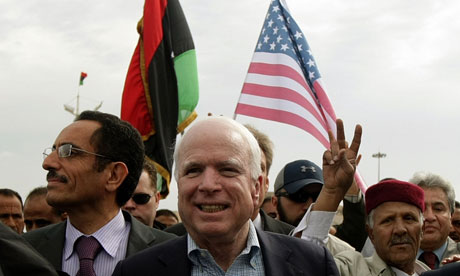
How harmful in particular it was to call for the Australian government to “support the movement” in Libya is seen by the fact that the Australian government is indeed supporting the opposition movement in Libya … by backing the horrific NATO bombing of that country! Ironically that February 26 rally was held just after Australian foreign minister, Kevin Rudd called for a no-fly zone to be imposed over Libya – the very “no-fly zone” that became the pretext for the all out imperialist bombing of Libya. The call for the Australian government to “support the movement” in Libya has thus served to build support for the imperialist intervention there. The establishment of a NATO puppet regime in Libya – no doubt with Western military bases – would be a deadly threat to progressive forces in neighbouring Egypt, Tunisia and Algeria – and indeed throughout the whole of North Africa.
Unfortunately even the NATO attack on Libya has not stopped the Solidarity With the Middle East People Power Committee and the left groups within it from wading further into the pro-imperialist swamp. Thus although Socialist Alternative, Solidarity and Socialist Alliance have formally declared their opposition to the NATO military intervention, they are supporting the thoroughly NATO-backed Libyan Opposition, who are now effectively acting as NATO’s ground troops. Meanwhile, a May Day leaflet from the Committee advertised a May 8 rally in support of the Washington-encouraged Syrian Opposition. To be sure the same leaflet did make worthy points about the situation in Egypt, Bahrain and Saudi Arabia. The problem however with the semi-Marxist, left groups involved in the Solidarity With the Middle East People Power Committee is that they seem to think that any anti-government movement calling for “democracy” is worthy of support. Yet the call for “democracy” can be used by both progressive and reactionary forces and by those in between. And since it is those “democratic” movements that fall in behind imperialist interests that get the most extensive media coverage and the most mainstream political support, it ends up being these pro-imperialist movements that the wavering left groups support the most.

Supporting movements that are backed by the big capitalist powers is not solidarity with the Middle Eastern masses. We in Trotskyist Platform believe that real solidarity with the downtrodden peoples of the Middle East means in fact opposing all imperialist intervention in the Middle East – whether that intervention comes in the form of military operations, diplomatic pressure or financial support for political groups. We call on leftists in this country to build united-front actions to fight for this. Let us not only oppose Washington and Canberra’s support for the oppressive monarchies ruling Jordan, Saudi Arabia, Qatar and Bahrain and its apologies for the new military junta in Egypt but oppose also their efforts to coopt opposition movements in those countries. Stop all political donations by the capitalist powers to organisations in the Arab world! All U.S. and Australian troops and cops get out of Iraq, Kuwait and the Persian Gulf! U.S./NATO/Australian troops get out of Afghanistan! Down with Western military aid to Israel! Support Libya against the NATO imperialists and their allies in the Benghazi-based Opposition. Down with the Gillard government’s financial backing for – and diplomatic support to – the pro-NATO Libyan Opposition!
The best solidarity we can give to the Arab toiling masses is to mobilise class struggle against our own imperialist rulers here at home. Such struggles in the imperialist centres would give the Arab masses the confidence to openly challenge imperialist domination of their region. It would inspire in the Arab working class a greater sense of their own power as part of an international class and would thus encourage them to break free from subordination to pro-capitalist “oppositionists.” Oppose the imperialist rulers of the U.S., Britain, Australia etc – the greatest enemies of the Middle Eastern masses! No to all imperialist political meddling in the Middle East! Down with the capitalist regimes in the Arab world – Fight for governments of workers and the poor throughout the Middle East!